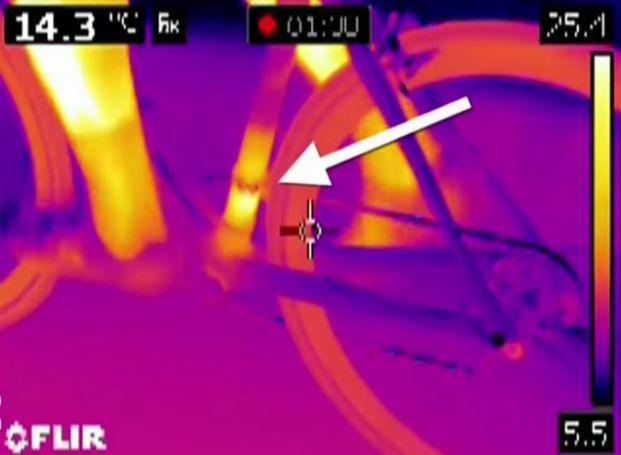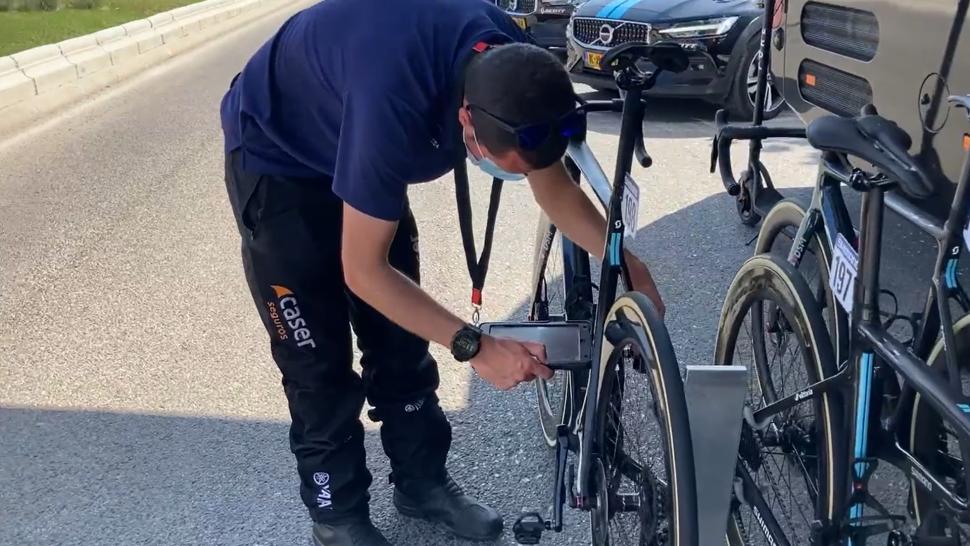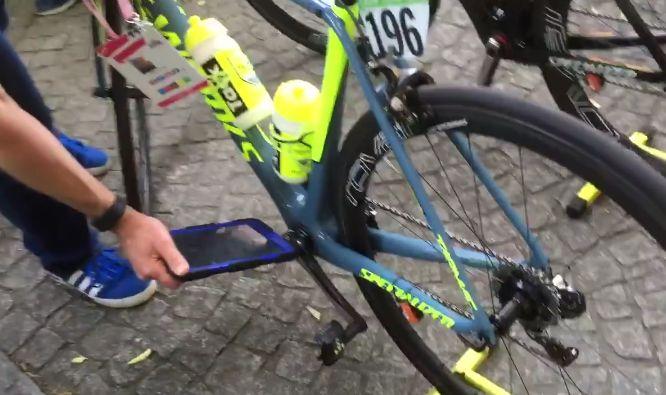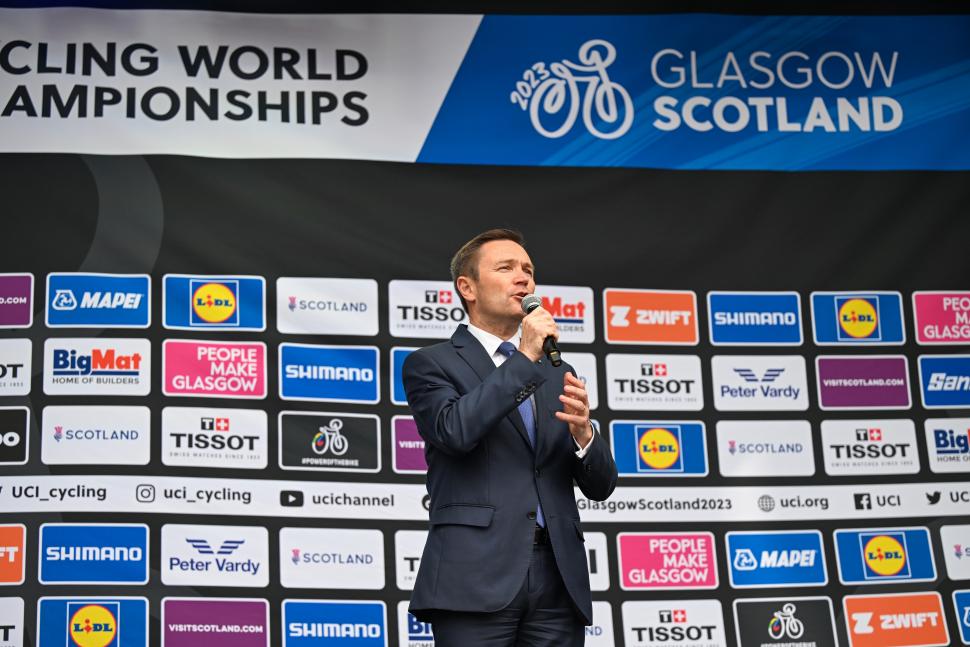- News
- Reviews
- Bikes
- Components
- Bar tape & grips
- Bottom brackets
- Brake & gear cables
- Brake & STI levers
- Brake pads & spares
- Brakes
- Cassettes & freewheels
- Chains
- Chainsets & chainrings
- Derailleurs - front
- Derailleurs - rear
- Forks
- Gear levers & shifters
- Groupsets
- Handlebars & extensions
- Headsets
- Hubs
- Inner tubes
- Pedals
- Quick releases & skewers
- Saddles
- Seatposts
- Stems
- Wheels
- Tyres
- Tubeless valves
- Accessories
- Accessories - misc
- Computer mounts
- Bags
- Bar ends
- Bike bags & cases
- Bottle cages
- Bottles
- Cameras
- Car racks
- Child seats
- Computers
- Glasses
- GPS units
- Helmets
- Lights - front
- Lights - rear
- Lights - sets
- Locks
- Mirrors
- Mudguards
- Racks
- Pumps & CO2 inflators
- Puncture kits
- Reflectives
- Smart watches
- Stands and racks
- Trailers
- Clothing
- Health, fitness and nutrition
- Tools and workshop
- Miscellaneous
- Buyers Guides
- Features
- Forum
- Recommends
- Podcast
 Motor hidden in bike frame (Stade 2 video image, April 2016).JPG
Motor hidden in bike frame (Stade 2 video image, April 2016).JPGFinancial “reward” package for motor doping whistleblowers confirmed, as UCI commits to “eradicating technological fraud at the highest level”
Three months after UCI president David Lappartient admitted that the potential use of hidden motors in bikes could “destroy cycling”, the sport’s governing body has formally launched a new financial rewards scheme for mechanical doping whistleblowers.
The UCI’s management committee, which met this week in Zurich during the road world championships in the Swiss city, today confirmed the creation of the “Fight against Technological Fraud rewards programme”, as it aims to “strengthens its fight” against so-called mechanical doping.
According to the UCI, the programme has been established to “encourage people with information on this subject to share it – confidentially – with the UCI in exchange for a financial reward” or other forms of support.
The governing body, which introduced ahead of this year’s Tour de France a new bike inspection tool to uncover hidden motors, also said the initiative underscores its “commitment to eradicating technological fraud at the highest level, reinforcing its dedication to maintaining fairness and integrity in cycling”.
While Belgian cyclocross rider Femke Van den Driessche remains the only elite level professional to have been banned for mechanical doping, after a concealed motor was found in her bike at the 2016 world championships in Zolder, accusations and innuendo concerning the use of hidden motors in the highest echelons of the sport continue to swirl around the peloton.
Last September, in the wake of Jumbo-Visma’s 1-2-3 atop the Col du Tourmalet at the Vuelta a España, a feat they repeated on the grand tour’s final podium as Sepp Kuss took the top spot ahead of Jonas Vingegaard and Primož Roglič, former Quick-Step pro Jérôme Pineau accused the Dutch team, without providing any evidence, of mechanical doping, while claiming that the UCI “don’t control anything anymore and do what the big teams want”.
Meanwhile, in May, a former actor whose restaurant chain, Italian Trattoria, sponsors Mark Cavendish’s Astana Qazaqstan team, hastily fled from an amateur race in France – with the bizarre scene featuring the driver of a team van reportedly hitting the race organiser and continuing to drive with him clinging to the bonnet – after allegations of motor doping were levelled against him, which he has strenuously denied.
And while, with the exception of Van den Driessche and low-level amateurs, the spectre of mechanical doping at elite level has been confined to rumours, blurry photos, and innuendo, in June the UCI warned any rider attempting to race the Tour de France with a hidden motor that it is “impossible to slip through the net”, and that a new “inspection tool” that takes advantage of the “latest technology” would be utilised at the French grand tour for the first time.
Later that week, UCI president Lappartient upped the ante, revealing in an interview with the Ghost in the Machine podcast that the world governing body was planning to pay whistleblowers and informants who come forward with “credible” information related to the suspected use of hidden motors in the peloton.
Lappartient said that financial incentives for motor doping whistleblowers would prove the UCI is taking the issue – which he claims has the potential to “destroy cycling” – seriously.
The Frenchman also raised concerns about the methods currently in place to detect the presence of hidden motors within bikes, such as handheld tablets, and the increasingly frequent use of tactical bike swaps during races, while insisting that the UCI is “not afraid” to catch even the sport’s biggest names if they’re found to be using a motor.
(Pauline Ballet/SWpix.com)
And on Friday, the UCI solidified Lappartient’s ambitions with the establishment of the “Fight against Technological Fraud” Rewards Programme (or the catchily titled FATF-RP), which it says will “support existing detection methods and address the evolving threats effectively”.
“The FATF-RP is designed to increase the UCI’s collection of actionable intelligence regarding risks, threats, and current tactics, including how unauthorised propulsion methods (e.g. motors) are being deployed in bicycles and used at races,” the UCI said in its new policy document.
“This initiative aims to encourage individuals who may possess critical information but are reluctant to come forward, thereby providing an additional tool for the UCI to address serious attempts to defraud the cycling community.
“The focus will be on developing information about the use of technological advances in hidden motors and other propulsion methods, enabling targeted bike controls and in-depth investigations, including also on historical cases of technological fraud in cycling.”
The incentives on offer under this policy include material support, financial assistance, and a monetary or value reward.
“These measures are designed to appropriately compensate individuals or entities which contribute valuable information that aids in the detection, prevention, or investigation of fraudulent activities,” the governing body added.
“The extent of the compensation or value shall take into consideration the material effort and potential investment put forward by the source as well as the potential risk of hardship or repercussion from such disclosure.”
As well as this new financial reward-based attempt to combat motor doping, the UCI’s management committee also confirmed several other changes to the sport at their meeting in Zurich this week.
These included adjusting the rules for participation in the U23 men’s category at the world championships, excluding riders who have a WorldTour or ProTeam contract from competing in that age category from next year on, while confirming the first-ever dedicated U23 races for women at a world championships (up to and including this year, the best placed under 23 rider in the elite race has been awarded the victory in the U23 category).
As reported earlier this week, a women’s edition of Milan-Sanremo has also been confirmed for 2025, and will take place before the men’s edition on 22 March, the first time a women’s version of the Italian classic will be held since the demise of the short-lived Primavera Rosa in 2005.
After obtaining a PhD, lecturing, and hosting a history podcast at Queen’s University Belfast, Ryan joined road.cc in December 2021 and since then has kept the site’s readers and listeners informed and enthralled (well at least occasionally) on news, the live blog, and the road.cc Podcast. After boarding a wrong bus at the world championships and ruining a good pair of jeans at the cyclocross, he now serves as road.cc’s senior news writer. Before his foray into cycling journalism, he wallowed in the equally pitiless world of academia, where he wrote a book about Victorian politics and droned on about cycling and bikes to classes of bored students (while taking every chance he could get to talk about cycling in print or on the radio). He can be found riding his bike very slowly around the narrow, scenic country lanes of Co. Down.
Latest Comments
- chrisonabike 3 sec ago
I think it would be fairer to blame the moon - as in "my client is a loony".
- Bungle_52 23 min 28 sec ago
Nice idea but Gloucestershire Constabulary are not interested as exemplified by this prvious NMOTD. Not only was there NFA for the close pass in...
- quiff 28 min 33 sec ago
The war years would work - 1917 (39 mill) or 1942 if you're rounding up (44 mill). Buy yes, it's been an upward trajectory since then.
- mctrials23 34 min 57 sec ago
Flippin heck!
- Rendel Harris 54 min 13 sec ago
As a keen cyclist married to a keen cyclist I can testify that there isn't the slightest comparison. The worst unprovoked comments (i.e. when a row...
- hawkinspeter 1 hour 55 min ago
I think black boxes are great for early detection of cognitive decline and/or sight problems. Someone's driving is going to become much less smooth...
- Bigtwin 2 hours 30 min ago
It's a fashion. https://guildford-dragon.com/shalford-driver-who-smashed-shalford-war-me...
- MTL Biker 2 hours 51 min ago
Robin Phans .....
- Rendel Harris 4 hours 32 min ago
Well it would be irresponsible enough if there were only cars and buses, if there are going to be "cars, buses and traffic" that's just suicidal...



Add new comment
6 comments
I am surprised the UCI seem so obsessed with this and at the same time a little aloof in the war against actual doping which seemd to appear andthen vanish again and again.
Instead of showing off a fancy array of gadgets to show they are looking for motors, would it not be easier to just impound and then get a 3rd party to test bike at races?
When a rider has to swap a bike for a 'mechanical' instead of the bike going back on the team car, it must be handed to a marshal who will keep hold of it until the race ends and it can be inspected by the scrutineers at the same time they do the bikes the rider clossed the line on.
If you make the right steps and make the as transparent as possible then you leave cheats fewer places to hide. The UCI and many other sports governing bodies seem to mess this bit up so much that is almost feels like a conspiracy such is the level of their ineptitude.
I absolutely agree with the thrust of your remarks but that suggestion probably wouldn't be practical because the mechanics generally try to fix bikes that are given them back to them in case something goes wrong with the replacement. If a rider is having an unlucky day with crashes and punctures they might need to change bikes four or five times, maybe even more, and obviously the team can't carry forty odd bikes to cover that number of changes for all their riders. I think the solution would be that all team cars have to pull into a "Parc Fermé" at the end of the race/stage so that the scrutineers can look at all the bikes on the car in addition to the bikes the riders finished on; they should also have the right to search the car for any incriminating parts that might have been removed. To add to that, and bearing in mind the way the drug dopers of the 90s were caught with raids on their hotel rooms, if it really is regarded as a serious problem the scrutineers should be given the right to demand inspection of all team bikes at any time during the race, including when they are being worked on overnight.
Well, your argument is a bit contradictory. If they need another bike you mention they may have a 3rd or 4th. or even a neutral bike in most events. If the bike is really not broken and is rideable, why did they change in the first place? I doubt the mechanics have the time to stop and fix the bike in the race while they are keeping pace with the riders, so I dont buy that arguemnt for one second.
Pro riders need everything to be perfect, often they will change a bike because they feel the indexing is slightly off or the discs are rubbing, things a mechanic might be able to change in very short order at the roadside, though not short order enough for the rider who needs a new bike straight away. Obviously this doesn't happen in the heat of the moment when the race is fully on, but it's not uncommon to see in the early part of a race the mechanics taking a minute or two to fix a bike before putting it back on the roof. Another case in point is punctures, where it is common for riders to take a whole new bike rather than change a wheel; the mechanics might well be able to fix a puncture or slip a new wheel onto the original bike ready for when/if the replacement goes wrong.
I didn't say at all that they might have three or four bikes available, I said that they may need to change bikes three or four times so the mechanics need to retain the original bike and see if it can be fixed so that when something goes wrong with the replacement they have another one available, they couldn't do that if they followed your idea of having to immediately hand over any bike that has been replaced to the marshals and with teams of eight, as I said, they can't carry 40 odd bikes on a car just in case.
while others don't notice that their position has been off by 30mm for a number of years .
I said they might change that often. They will have thier own official spare and there will always be another team members bike they can use, plenty of times ive seen a team member donate on the fly if the team car is stuck well behind. And they also have neutral service bikes provided.
But the point you moved of track from was, when a bike is left it needs marking as being ridden at some point before it can be taken back by the team. If a team were to be using motors, the time to hide it is when the rider isnt on it, ie on the car, where the mechanics can remove or swap out a component. Who is to say?
I am more bothered that the UCI see this as a bigger threat than actual doping by the noises they are making. another point totally glazed over.